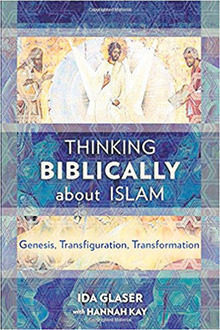Can you do better?
A diverse, packed meeting in Oxford during April 2016 saw the launch of this book, the aim of which is self-explanatory.
Anthony McRoy

THINKING BIBLICALLY ABOUT ISLAM:
Genesis, Transfiguration, Transformation
By Ida Glaser with Hannah Kay
Langham Publishing. 346 pages. £14.99
ISBN 978 1 783 689 125
Arguably, few concerns are more vital, given Islamic State terrorism, the murder of an Ahmadi in Glasgow by a Sunni, intensifying Muslim outreach towards Christians and others, and the election of a Muslim as Mayor of London.
Transfiguration in reverse
Ida asked, with characteristic humility, that ‘if anyone can do better,’ (to answer how to think biblically about Islam) ‘please do’! Her central point was that Islam was a reversal of the Transfiguration – where the Law (represented by Moses) and the Prophets (by Elijah) find their climactic fulfilment in Jesus, something Islam rejects. She asked whether we could move beyond the trauma of events (like the Lahore bombing), to forgiveness and celebration of survival.
The book was commended by a number of speakers, including the Muslim author Shabbir Akhtar, who complimented Ida on her ‘generous’ assessment of Muhammad, and Michael Nazir-Ali, who gave an excellent talk on the differences between Islam and Christianity: e.g. Christians engage with Source Criticism, whereas Qur’anic advocates cannot. Nazir-Ali also considered bridge-building in the face of Shari’ah.
Understanding each other
Ida’s book is very accessible and clearly aimed at both Christians and Muslims, elucidating the beliefs of both. She is to be commended for this, as each tends to have faulty views of the other. It simply will not do for people to wallow in ignorance, when an understanding of each other’s faith is vital to make sense of current events. The the book is at pains to point to our common humanity.
On the other hand, at times it can be too generous. For example, p.20 refers to Genesis 1-11 and God’s plan to bless ‘all peoples’ – defined as ‘Muslims, Jews, Christians, Hindus, Sikhs and everyone else’. Unless we qualify this as meaning conversion from these other faiths to Christ, this is open to misunderstanding – and surely by ‘peoples’ the emphasis is on nationality, rather than religion?
Another example, on p.32, deals with the Islamic denial of the need for sacrifice, by presenting Muslim concern to obey God as ‘offering oneself to God’. Surely this is too wide; ultimately, it is by the actual sacrifice of Christ that we are saved. However, people who disagree with Ida could always take up her invitation to do better – if they can!


